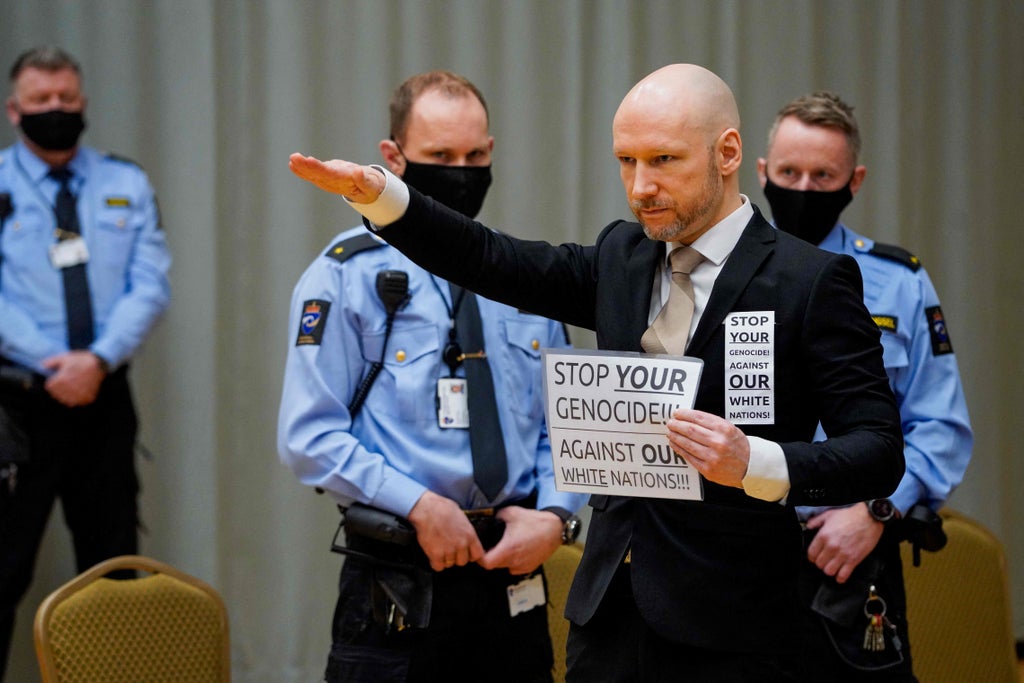
Mass murderer Anders Behring Breivik gave a Nazi salute on Tuesday as he entered court for a parole hearing that will decide if he should be released after spending more than a decade behind bars.
Mr Breivik massacred 77 people in July 2011 during Norway’s most violent peace time atrocity ever. The far-right extremist killed eight people with a car bomb outside the government headquarters in Oslo before gunning down 69 others on the island of Utoya at a Labour Party youth camp, most of them teenagers.
The Telemark District Court will rule whether Mr Breivik is still so dangerous that society needs extra protection against him. Under Norweigan law, the 42-year-old is eligible to seek parole after serving the first 10 years of his term.
As he entered the court wearing a dark suit with a shaven head, Mr Breivik made a white supremacist sign with his fingers before raising his right arm in a Nazi salute signalling that he had entered the court.
Mr Breivik also carried signs, printed in English, including one that said “Stop your genocide against our white nations” and “Nazi-Civil-War”. He was later told to stop displaying them as the prosecution presented its case.
Addressing the judge, Mr Breivik described himself as a parliamentary candidate.
He is serving Norway's maximum sentence of 21 years, which can be extended indefinitely if he is deemed a continued threat to society.
The Telemark court in Skien, southwest of the capital, where Mr Breivik is serving his sentence, is hearing the case this week after the Oslo state prosecutor's office last year rejected his application for early release.
“Our position is that it is necessary with (continued) confinement to protect society,” the prosecutor in charge, Hulda Karlsdottir, told Reuters ahead of the hearing.
Ms Karlsdottir started the hearing by saying the imprisonment conditions of Mr Breivik, who legally changed his name to Fjotolf Hansen in 2017, will have no influence on the matter of parole.
Mr Breivik shook his head as the prosecution made its case, which included a passage from the original 2012 verdict which said that even after serving for 21 years in prison the defendant would still be a very dangerous man.
Addressing the court, Mr Breivik blamed his crimes on online radicalisation by a leaderless network of far-right extremists, which he said had motivated his attacks.
"I was brainwashed," he said in a speech that lasted more than an hour. "The order was... to re-establish the Third Reich. And how to do that is up to each soldier.”
Mr Breivik also told the court that he would refrain from violence, despite continuing to espouse neo-Nazi beliefs.
“Today, I strongly dissociate myself from violence and terror," he said. "I hereby give you my word of honour that this is behind me forever.”
If granted parole, which experts say is unlikely, Mr Breivik also offered to live in the Arctic or a non-Western country.
Proceedings are taking place over a maximum of four days in a prison gymnasium converted into a makeshift courtroom, with a decision expected about a week later.
If his request for release is denied, Breivik can apply for a new probation hearing in a year's time, Ms Karlsdottir said.
Families of the victims and survivors had feared Mr Brevik would be given a platform that could inspire like-minded ideologues and grandstand his extreme views during the hearing, which experts say is unlikely to deliver him an early release.
“The only thing I am afraid of is if he has the opportunity to talk freely and convey his extreme views to people who have the same mindset,” Lisbeth Kristine Røyneland, who heads a family and survivors support group, said ahead of the hearing.
Mr Breivik lost a human rights case in 2017 when an appeals court overturned the decision of a lower court that his near-isolation in a three-room cell was inhumane.
The European Court of Human Rights rejected a subsequent appeal.







